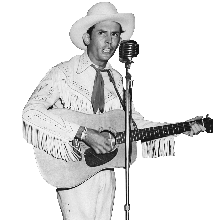Archives
Music
The roots of commercial country music are generally traced to 1927, when music talent scout Ralph Peer recorded Jimmie Rodgers and The Carter Family. Popular success was very limited, though a small demand spurred some commercial recording. After World War II, there was increased interest in specialty styles like country music, producing a few major pop stars. The most influential country musician of the era was Hank Williams, a bluesy country singer from Alabama. He remains renowned as one of country music’s greatest songwriters and performers, viewed as a “folk poet” with a “honky-tonk swagger” and “working-class sympathies”. Throughout the decade the roughness of honky tonk gradually eroded as the Nashville sound grew more pop-oriented. Producers like Chet Atkins created the Nashville sound by stripping the hillbilly elements of the instrumentation and using smooth instrumentation and advanced production techniques. Eventually, most records from Nashville were in this style, which began to incorporate strings and vocal choirs.
 By the early part of the 1960s, however, the Nashville sound had become perceived as too watered-down by many more traditionalist performers and fans, resulting in a number of local scenes like the Lubbock sound and the Bakersfield sound. A few performers retained popularity, however, such as the long-standing cultural icon Johnny Cash. The Bakersfield sound began in the mid to late 1950s when performers like Wynn Stewart and Buck Owens began using elements of Western swing and rock, such as the breakbeat, in their music. In the ’60s performers like Merle Haggard popularized the sound. In the early 1970s, Haggard was also part of outlaw country, alongside singer-songwriters such as Willie Nelson and Waylon Jennings. Outlaw country was rock-oriented and lyrically focused on the criminal antics of the performers, in contrast to the clean-cut country singers of the Nashville sound. By the middle of the 1980s, the country music charts were dominated by pop singers, alongside a nascent revival of honky-tonk-style country with the rise of performers like Dwight Yoakam. The 1980s also saw the development of alternative country performers like Uncle Tupelo, who were opposed to the more pop-oriented style of mainstream country. At the beginning of the 2000s, pop-oriented country acts remained among the best-selling performers in the United States, especially Garth Brooks.
By the early part of the 1960s, however, the Nashville sound had become perceived as too watered-down by many more traditionalist performers and fans, resulting in a number of local scenes like the Lubbock sound and the Bakersfield sound. A few performers retained popularity, however, such as the long-standing cultural icon Johnny Cash. The Bakersfield sound began in the mid to late 1950s when performers like Wynn Stewart and Buck Owens began using elements of Western swing and rock, such as the breakbeat, in their music. In the ’60s performers like Merle Haggard popularized the sound. In the early 1970s, Haggard was also part of outlaw country, alongside singer-songwriters such as Willie Nelson and Waylon Jennings. Outlaw country was rock-oriented and lyrically focused on the criminal antics of the performers, in contrast to the clean-cut country singers of the Nashville sound. By the middle of the 1980s, the country music charts were dominated by pop singers, alongside a nascent revival of honky-tonk-style country with the rise of performers like Dwight Yoakam. The 1980s also saw the development of alternative country performers like Uncle Tupelo, who were opposed to the more pop-oriented style of mainstream country. At the beginning of the 2000s, pop-oriented country acts remained among the best-selling performers in the United States, especially Garth Brooks.

